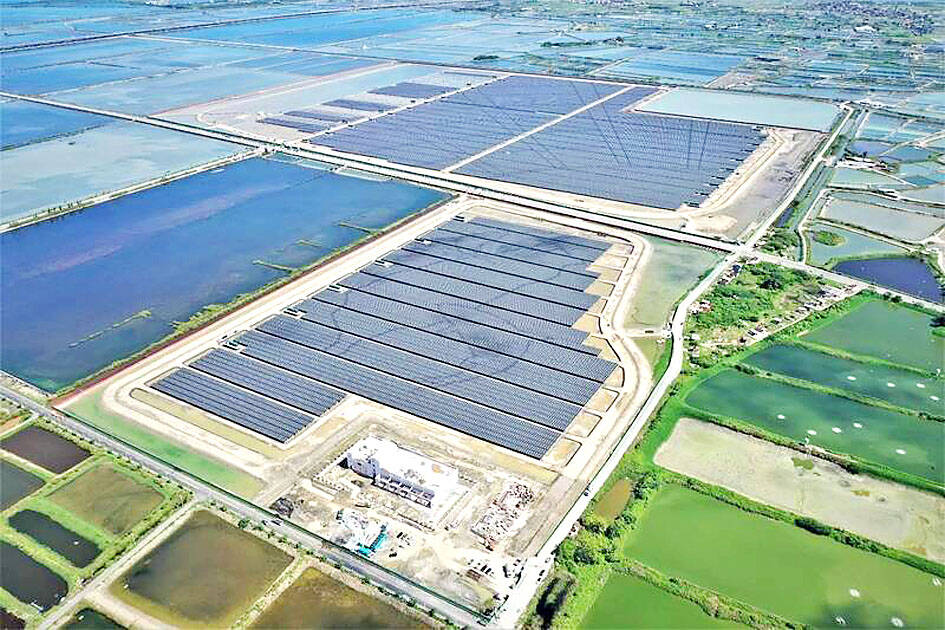A government program to develop solar energy has harmed farmers and threatens Taiwan’s food security, a group of academics said yesterday.
Taiwan’s land use laws have been steadily deregulated to facilitate photovoltaic construction since 2015, but there has been a steady trend away from the principle of sustainable development, the academics said in a petition, which had garnered 80 signatures.
The government must establish clear standards and procedures to select sites for solar installations to minimize the impact on farmers’ and fishers’ livelihoods, the environment and food security, the petition said.

Photo: Taipei Times file
Regulations give officials “virtual carte blanche” to declare farmland to be unsuited for agriculture, National Chung Kung University (NCKU) professor of urban planning Huang Wei-ju (黃偉茹) said.
The land is rezoned for use as solar farms with almost no factual basis, Huang said.
For example, 500 hectares designated as agriculture-only in Changhua County’s Dacheng Township (大城) was rezoned to permit photovoltaic construction, despite 89 percent of the land being intensively cultivated, she said.
Taiwan needs 132,000 to 570,000 hectares for green energy installations to achieve its 2025 target of 40 to 80 gigawatts generated from renewable sources, NCKU professor of urban planning Chao Tsu-yuan (趙子元) said.
That would require a comprehensive rethinking of national land use plans, a process that the government has not gone through yet, Chao said.
Failure to address controversies arising from the selection of solar energy sites would complicate implementation of zoning plans over the next two years, National Chengchi University (NCCU) assistant professor of land economy Tai Hsiu-hsiung (戴秀雄) said.
Green energy zones should be established under the Electricity Act (電業法) and Renewable Energy Development Act (再生能源發展條例), not extemporized by executive order, Tai said.
The effects of renewable energy installations should be more extensively examined in environmental impact assessments, he said.
It would be a mistake for Taiwan to fixate on net zero carbon emissions at the expense of other considerations, or reduce the challenge of mitigating climate change to merely installing renewable energy installations, National Taipei University professor of urban planning Liao Kuei-hsien (廖桂賢) said.
Rushing to build solar and wind farms without adequate planning would lead to a host of long-term problems, including loss of biodiversity and food production, Liao said.

The Grand Hotel Taipei on Saturday confirmed that its information system had been illegally accessed and expressed its deepest apologies for the concern it has caused its customers, adding that the issue is being investigated by the Ministry of Justice Investigation Bureau. The hotel said that on Tuesday last week, it had discovered an external illegal intrusion into its information system. An initial digital forensic investigation confirmed that parts of the system had been accessed, it said, adding that the possibility that some customer data were stolen and leaked could not be ruled out. The actual scope and content of the affected data

‘LIKE-MINDED PARTNER’: Tako van Popta said it would be inappropriate to delay signing the deal with Taiwan because of China, adding he would promote the issue Canadian senators have stressed Taiwan’s importance for international trade and expressed enthusiasm for ensuring the Taiwan-Canada trade cooperation framework agreement is implemented this year. Representative to Canada Harry Tseng (曾厚仁) in an interview with the Central News Agency (CNA) said he was increasingly uneasy about Ottawa’s delays in signing the agreement, especially as Ottawa has warmed toward Beijing. There are “no negotiations left. Not only [is it] initialed, we have three versions of the text ready: English, French and Mandarin,” Tseng said. “That tells you how close we are to the final signature.” Tseng said that he hoped Canadian Prime Minister Mark Carney

President William Lai (賴清德) yesterday bestowed one of Taiwan’s highest honors on Saint Vincent and the Grenadines (SVG) Ambassador Andrea Clare Bowman in recognition of her contributions to bilateral ties. “By conferring the Order of Brilliant Star with Grand Cordon on Ambassador Bowman today, I want to sincerely thank her, on behalf of the Taiwanese people, for her outstanding contribution to deepening diplomatic ties between Taiwan and SVG,” Lai said at a ceremony held at the Presidential Office in Taipei. He noted that Bowman became SVG’s first ambassador to Taiwan in 2019 and

A man walks past elementary school artworks at the Taipei Lantern Festival in Ximen District yesterday, the first day of the event. The festival is to run from 5pm to 10pm through March 15.